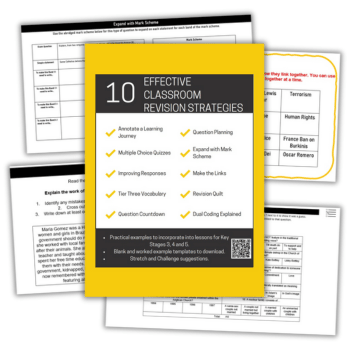GCSE exam preparation – Better uses for past papers

Claire Gadsby serves up some ideas for developing a more varied revision ‘diet’ for your students that’s less reliant on drilling and completing exams from yesteryear…

The need to prepare students for examination success is a vital part of any teacher’s job, and brings with it a distinct set of pressures.
The specific challenges may vary – anything from changed exam specifications to the fallout of COVID-19 – but the stakes remain consistently high. It’s therefore perhaps no surprise that the use of past exam papers remains such a common practice in the lead-up to exams – but is this really the most effective way of preparing students for examination success?
Fun, low stakes and rooted
On the one hand, using past papers allows pupils to become familiar with the language and layout of the exams they’re due to take, and may help alleviate some of the anxieties they might have. It can also help to identify areas of strength and weakness, which can then be used formatively by teachers.
However, as I’ve seen in my work with thousands of pupils across hundreds of schools, pupils soon tire of repeatedly looking at past papers – it’s actually possible to achieve many of the same benefits, but in a much more engaging way.
How? By weaving past paper practice into a wider, more varied GCSE revision ‘diet’, with the key levers of ‘choice’ and ‘challenge’ at its heart.
Research suggests that 88% of students who revise effectively achieve or exceed their target grade. Yet revision is still often perceived as a daunting, difficult and/or boring activity by pupils – so how can we change this? We can all create more effective revision activities by:
• Better harnessing pupils’ emotional engagement and curiosity • ‘Drip-feeding’ revision and exam practice into day-to-day learning, to make it both more manageable and memorable • Including opportunities for collaborative revision These components are always powerful, but perhaps more so now than ever.
A key part of our current challenge surely lies in trying to minimise the stress and anxiety currently being experienced by learners who are striving to achieve their full potential against the backdrop of an ongoing pandemic.
All the more reason, then, to focus our energy on creating classrooms in which revision activities are fun, low stakes and crucially, rooted in the latest research about how memory actually works.
Enhancing the revision ‘diet’
Begin by asking yourself, ‘What is the specific skill I need to rehearse with my class at this present time?’ If the answer to that involves building stamina or improving time management, then tackling a whole practice paper might actually be exactly what you need.
If, however, it’s something beyond these examples, you might try:
1. Exam nibbles
These are individual exam questions taken out of context – e.g. in the middle of a geography lesson on foreign aid, give pupils five minutes to answer a short exam question on deforestation.
Here, we’re still helping pupils become more familiar with exam questions and terminology, but in a more palatable and less stressful way that’s easier to fit into usual lessons. As there’s no time to revise or panic, we can get an accurate snapshot of what pupils have understood and retained.
As teachers, we can analyse specific gaps and weaknesses and feedback/model improvements in smaller chunks that are easier for pupils to retain.
Compare this to ‘mock feedback’ lessons, where pupils can feel swamped by too many targets for improvement being delivered simultaneously.
Importantly, this approach involves interleaving – the mixing together of different topics and types of practice – which has been proven to strengthen long-term learning.
2. Magnifying the Message
Build an interactive classroom display around an exam question you have blown up, making it readable from anywhere in the classroom. Involve pupils in physically highlighting key words, generating bubbles with suggested ideas and explaining their thinking.
Trending
Update the questions regularly throughout the course. Drawing on the proven power of metacognition, this strategy helps to reiterate key learning and exam etiquette by keeping it in pupils’ eyelines.
3. The sealed envelope challenge
Arrange your class into small groups, before piquing pupils’ curiosity by placing different exam questions inside sealed envelopes and allocating one per group.
Each group must then work together to answer their question on large poster paper, before presenting their answer to the rest of the class. You could add further challenge by asking them to do this as creatively, quickly or succinctly as possible. Their finished posters could then potentially form part of your revision displays.
Discussion and teamwork elevate this activity. Whilst each pupil will only answer part of the exam, they will experience all of it through peer explanation. Intervene to correct, and probe understanding where necessary.
4. Beat your Best – The ‘Just a Minute’ challenge
In the middle of a typical lesson, set a timer for 60 seconds and challenge your pupils to generate as many words, ideas and/or pictures as possible that relate to a particular topic, without talking to anyone.
Afterwards, ask pupils to count and record how many they came up with. There’s no need for you to record their scores – instead, explain that you’ll be challenging them to beat their own score when you repeat the activity at the end of that lesson or week. Invite them to quickly look back at relevant notes in preparation.
It’s powerful to be able to demonstrate to each pupil that they’re improving incrementally over time – something that’s hard to do when practising whole papers and feeding back in whole grades, where there may be little difference.
It can be more motivating to practice questions and skills separately, so that learners can see exactly where they’re getting better, relative to their own previous personal best.
5. Lucky Dip Learning
Fill a brightly coloured gift bag with a range of questions, symbols and key terms, minus their definitions.
These should be based on prior learning from across the syllabus, but with multiple examples of those aspects your pupils find most challenging. Place the bag somewhere prominent in the classroom and regularly invite pupils to pull out a random challenge to be tackled individually or by the whole class.
Ideal for use in starter or plenary slots, this approach again breaks revision down into more manageable and appealing chunks. It’s further based on the principle of randomisation, which is often employed to great effect in online games and hard to resist. Try it, and you might be surprised by how even the most jaded and cynical pupils can’t seem to resist the lure of the lucky dip!
Ultimately, revision doesn’t have to be a chore for pupils or teachers. Find out more about our Radical Revision online revision programme – and how its innovative power strategies, such as ‘30 Circles’, ‘Nailed with Neon’ and ‘Split Them Up’ can help your pupils achieve their full potential – by joining one of our FREE online introductory sessions for your Y11 and Y13 pupils.
Science evolved
Radical Revision is a motivational online revision programme for exam success in all subjects, launching in January 2022. The 12-week programme of live, interactive workshops is designed to offer sustained structure and support to pupils in the lead-up to their exams.
Students are introduced to Claire’s cutting-edge revision techniques, which have been developed based on the latest research into how the brain and memory works.
Claire Gadsby is an educational trainer, author and founder of Radical Revision; for more information, visit clairegadsby.com/radical-revision. Browse more great ideas to help with GCSE English Language revision, including our AQA English Language Paper 1 ultimate revision booklet.











